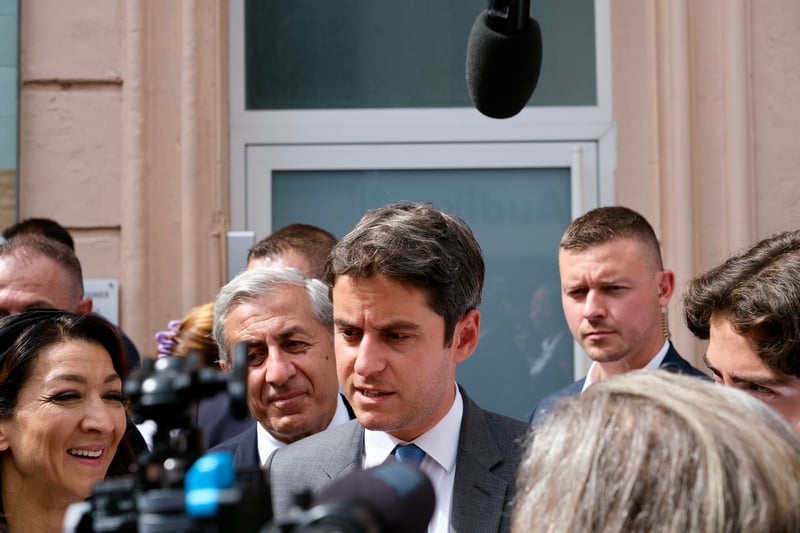MARSEILLE, France (CN) — On Friday, French President Emmanuel Macron launched talks with the country’s leading political groups to determine who will become France’s next prime minister.
Though the optics of the strategy promote cross-party collaboration and an openness to compromise, critics argue Macron is reminding the government who’s boss.
“This is a strategy that aims to keep control over the situation, because basically, he’s reminding everyone that he is the president of the republic who decides to appoint a prime minister when he wants, who remains able to control the agenda,” Luc Rouban, a senior research fellow at Sciences Po Paris, told Courthouse News.
On June 9 — the night of the European elections — Macron unexpectedly announced the decision to dissolve France’s government and hold snap elections. The shakeup came as the European election results rolled in, which showed France’s National Rally, known as the RN — the extreme-right party led by Marine Le Pen and her protégé Jordan Bardella — taking an unprecedented number of seats in the EU Parliament.
France’s fractured left wing united surprisingly quickly to form a coalition, the New Popular Front — including the Socialists, Communists, Greens and far-left France Unbowed — which campaigned under the common goal of blocking the RN from winning an absolute majority in parliament. If they had won, it would have effectively given the extreme-right control of the government for the first time in France’s modern history.
Though polls showed the RN leading in France’s snap elections, the country was hit with a curveball when the New Popular Front came out on top, winning a relative majority in parliament. The RN came in third after Macron’s centrist coalition.
But the weeks following the results on July 7 showed that the elections would not be as decisive as expected.
Macron was in no rush to appoint a prime minister that would replace Gabriel Attal. In the roughly three weeks between the elections and the Olympics, the president announced that Attal would stay in power in a caretaker role through the end of the games.

During that time, the New Popular Front showed mounting frustration that the president wouldn’t appoint their candidate for prime minister, Lucie Castets, deeming Macron’s hesitations as undemocratic in the wake of the coalition’s relative win.
On Friday, the president invited the New Popular Front to engage in talks over the country’s next government, with the RN following on Monday. While Macron has acknowledged that the coalition won the most seats in parliament, the general rhetoric coming from centrists has been that without a clear absolute majority, there wasn’t a clear winner in the elections.
“He reminded us that he should be the arbiter in his constitutional role, but we have the impression that he wants to be the selector, meaning the one who would compose the future government of the country,” Manuel Bompard, a deputy from the New Popular Front, told a crowd of reporters outside the Elysée on Friday morning.
Ultimately, Macron will decide who will become France’s next prime minister.
“So that is very important, and he is the one who will ultimately decide on the nomination, which is [a constitutional right], and he does not intend to bow to the dictates of the New Popular Front,” Rouban said.
The past few weeks have shown that Macron is likely to appoint someone more centrist than left wing.
“So I don’t think we can really expect an agreement, because Emmanuel Macron said it very well, he said clearly that in any case, his idea would be to continue the reforms that he had already carried out in 2022 and since 2017,” Rouban said. “So for him, he’s actually looking for a centrist government coalition that can continue his reform work.”

In recent years, Macron launched a series of controversial reforms that both left and right-wing parties sought to appeal. In the spring of 2023, the president raised France’s retirement age from 62 to 64, which sparked nationwide protests for weeks and garnered international attention. Changes to labor laws and immigration were also on the table, and controversial.
Macron had been expected to seek a compromise across the political spectrum that will be anchored in a centrist force, which is what these discussions are officially designed to achieve.
“The president has fixed a clear goal: he has asked republican forces to work and listen to each other to form the largest majority, that’s to say with the most MPs and also one that is the most stable, meaning that it cannot be overturned,” a spokesperson from the Elysée said.
But Castets came out of Friday’s meeting expressing positivity and hope for what’s to come, telling reporters that the New Popular Front was extremely satisfied with a rich discussion that came out of the Elysée meeting.
“He acknowledged that a message had been sent by the French,” Castets told reporters. “He is lucid about this.”
Macron is expected to name a new prime minister next week.